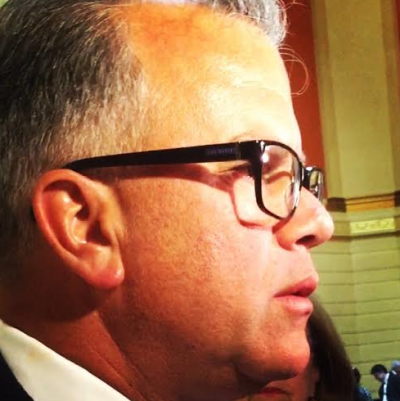10 Things to Know About RI’s $500M Health IT Project
Tuesday, September 20, 2016
What is the fiscal - and technical - health of the new UHIP portal, which rolled out in RI last week? Sides differ.
Now, the state is requesting an additional $124 million in federal funding that would bring the total to nearly a half billion dollars, for roughly $487.4 million from 2011 though 2018.
Former gubernatorial candidate and founder of WatchdogRI, Ken Block, who has testified on UHIP in the past, expressed his concerns for the both the cost, and the product.
GET THE LATEST BREAKING NEWS HERE -- SIGN UP FOR GOLOCAL FREE DAILY EBLAST“I believe based on what I’ve seen, and I’ve used the UHIP system, the experience was not good,” said former gubernatorial candidate Ken Block, who founded the advocacy group Watchdog RI. "It’s far from quality software. The state of Rhode Island needs to think long and hard of what it’s using.”
Last Tuesday, the state touted the UHIP rollout to the new, integrated eligibility system, stating it will “provide the best possible value for taxpayers by expanding protections against waste and fraud, and more efficiently connecting people to services” and “improve customer service by making it easier and more convenient for Rhode Islanders to apply for and track their benefits.”
SLIDES: Ten Things to Know About $500 Million UHIP Program
The new computer system, which will now handle Medicaid, food stamps, as well as HealthSourceRI, was met with mixed reviews.
“Over the past week, we identified several different issues related to printing and distributing of EBT cards. We have had teams in place in all of our Department of Human Services field offices who worked to quickly diagnose, prioritize and resolve these issues,” said Sophie O’Connell in the Executive Office of Health and Human Services. “On day one, some workers also experienced issues with their log-in passwords. Teams were available at each field office location to assist with resetting passwords, and this issue was quickly resolved.”
“With any technology project of this size, there will be issues in the immediate days, weeks and months after launch,” continued O’Connell. “This is normal, expected and manageable, and teams are ready to respond as issues emerge in real time. Our top priority is ensuring that Rhode Islanders’ needs are being met.
Labor Issues, Reviews Forthcoming
Following an incident at DHS last Wednesday which saw a case worker assaulted by a woman with a computer, and other workers hit with papers, the head of RI Council 94, who represents state employees, expressed his concerns.
“Workers feel the new computer system isn't working, with little to no training, and are fearful of being injured at work,” J. Michael Downey, President of Rhode Island Council 94, AFSCME, AFL-CIO, told GoLocalProv.com on Monday. “Workers would like a written policy in regards to workplace violence and any and all other workplace policies to protect all workers from injury.”
Downey spoke to what his biggest fear is of the new system at this stage.
“Having management act as though things are going smoothly,” said Downey.
State Senator Lou DiPalma (D-District 12) who has been at the helm of the oversight over UHIP at the General Assembly, spoke to his views on the IT launch.
“Having been involved in the specification, design, development, integration and test of large-scale, complex Department of Defense weapon systems, over the last 34 years, I would say the last week’s UHIP roll-out has gone relatively smoothly,” said DiPalma on Monday. “While some challenges have been realized, and I would expect additional issues to manifest themselves, the team’s daily attention to addressing and prioritizing the outstanding issues is paying dividends. Continued vigilance and oversight is paramount.”
Meanwhile, taxpayer and advocacy groups continue to watch the costs associated with the program, with the Rhode Island Center for Freedom and Prosperity stating last fall — when the total cost was thought to be $364 million"
“The final cost of UHIP could end up dwarfing these figures for Rhode Islanders, notwithstanding additional annual operational costs. A major goal of UHIP is to ensure that the state provides as much social service aid to as many people as possible. Nicknamed the "Dependency Portal" by the Center in 2012, UHIP will proactively promote people's eligibility for a wide array of public assistance programs, based on the financial and personal information they submit to the state when applying for a healthcare exchange subsidy or for Medicaid,” said Mike Stenhouse, CEO for the Center.
"It is one thing to upgrade informational systems; it is an entirely different issue when those upgrades are used as a strategic tool to encourage people to become dependent on government assistance, and driving up costs for taxpayers. It is not the proper role for government to discourage a productive and self-sufficient lifestyle,” said Stenhouse.
Related Slideshow: 10 Things to Know About RI’s $500M Health IT Project
Related Articles
- RI’s HEALTH Approves Closing of Memorial Hospital’s Obstetrics Services
- Brown Receives $11.5 Million Grant From the National Institutes of Health
- Guest MINDSETTER™ DiPalma & Bann: Rhode Islanders Can be Proud of Children’s Health Improvements
- NEW: Montanaro Resigning as Head of RI Dept. of Behavioral Health
- UNAP, Elected Leaders to Urge Health Dept. to Halt Memorial Hospital Closings
- 30 Foods to Eat for Healthy Hair and Skin
- Smart Benefits: New Rule Proposed to Limit Short-Term Health Coverage
- The Worst Non-Deadly Health Conditions
- Smart Benefits: Millennials Still find Healthcare Unaffordable
- HealthSource RI Deadline Extended by Weekend Storm
- Guest MINDSETTER™ Blake Filippi: Supreme Court Implications for HealthSource RI
- Speaker Mattiello Has Sights on Ending HealthSource RI
- Sherman Named New HealthSource RI Director
- MINDSETTER™ Croke: Innovative Partnerships Help RI Residents Get Healthy, Save Money & Make History
- New Competition for HealthSource RI Emerges
- NEW: Raimondo Replaces Ferguson at HealthSource RI
- NEW: HealthSource RI Issues Enrollment Deadline Updates
- NEW: HealthSource RI Reports 4,642 Processed Applications to Date
- NEW: Healthsource RI Announces Health Benefits Exchange Rates
- Smart Benefits: Will HealthSource RI Meet Enrollment Expectations?
- Raimondo’s Choice for HealthSource RI Failed in Vermont
- Smart Benefits: HealthSource RI Gets More Federal Funding
- NEW: Ex-HealthSourceRI Director Ferguson Arrested
- Smart Benefits: 10 Days to Shop for New HealthSource Plan for Jan. 1
- See Clinton Video - Discussion of Health Now in The Forefront















